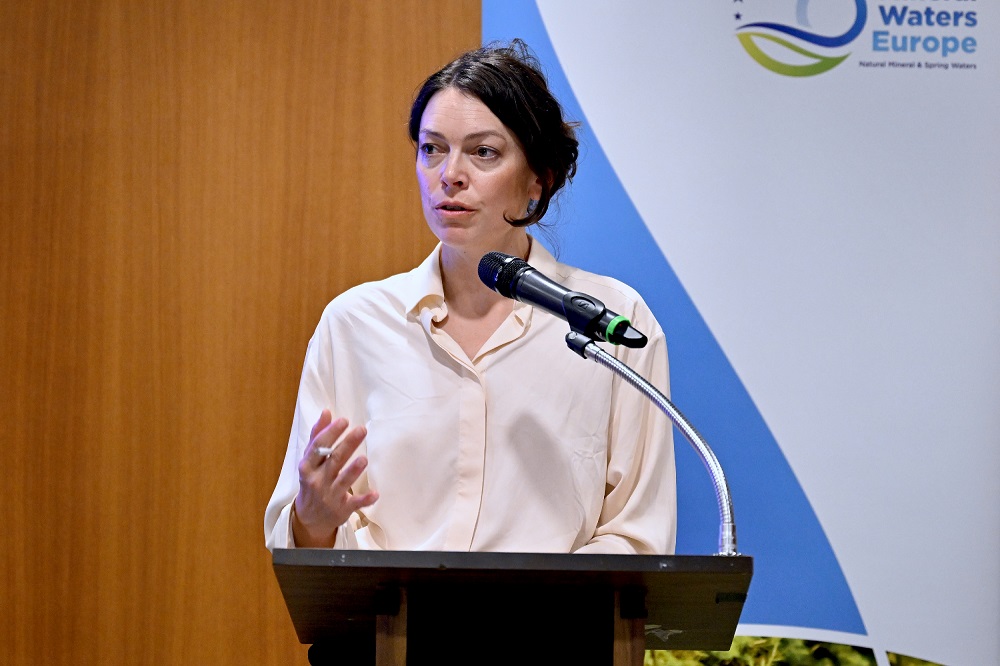Across Europe, floods and droughts are no longer isolated disasters, but recurring threats that are reshaping communities and economies. From flash floods to prolonged droughts, governments are grappling with this new reality .
Since 2018, more than half of the continent has suffered from extreme drought conditions, according to the European Environment Agency (EEA), with some 30% of people in southern Europe facing permanent water stress.
These events have made it clear that we can expect extreme weather events become more frequent, so the need for robust, adaptive solutions to manage water resources is more urgent than ever.
With policy-makers at national, regional and local levels across Europe confronting these challenges, The Parliament magazine organized a dinner discussion in the European Parliament in Strasbourg to explore solutions. In partnership with Natural Mineral Waters Europe – a non-profit trade association which represents more than 550 natural mineral and spring water producers in Europe – the event aimed to highlight critical gaps in the EU’s water resilience efforts and explore how policymakers can create a supportive framework to replicate successful collaborations in water resource management.
Europe is currently experiencing two extremes – moving from periods of water scarcity and drought, to grappling with devastating floods
Dimitras Tsiodras MEP
“Europe is currently experiencing two extremes – moving from periods of water scarcity and drought, to grappling with devastating floods,” said MEP Dimitras Tsiodras, a member of the ENVI and ITRE committees and the co-host of the debate.
Coming from Greece – which has been hit by frequent droughts and floods in recent years – Tsiodras said the topic was “very close to my heart” and pledged it would be one of his major priorities this term. “We need to enhance water resilience and ensure sustainable fresh water supplies for both people and the environment, supported by adequate structural investments and innovation,” he said, pointing out that water stress is already affecting 20% of Europe’s territory and 30% of its population, with an estimated economic cost of €9bn annually. “These figures are likely to increase because of the climate crisis,” he added.
Tsiodras said policymakers needed to act more decisively given the scale of the challenge, noting that improvements under the Water Framework Directive have been “modest at best.”
Building on these concerns, NMWE Secretary General Patricia Fosselard emphasized the urgent need for actionable solutions. She highlighted NMWE’s hands-on experience in water stewardship and environmental protection, describing their members’ initiatives as replicable models for fostering water resilience in different contexts. Through collaborative projects and conservation strategies, she said, NMWE demonstrates how proactive water management can be scaled to address broader challenges of resource protection and sustainability.
Fosselard also emphasized the critical role of data in water resilience planning. By expanding access to comprehensive data, local stakeholders can create tailored plans to address specific shared challenges in watersheds, such as drought-prone regions or flood-risk areas. She also encouraged the establishment of “collaborative platforms” that could address these challenges while bringing significant co-benefits, such as enhancing biodiversity through activities such as replanting native tree species and restoring wetlands “to retain water and foster vegetation.”
She concluded that such coordinated actions, bringing together stakeholders like farmers, residents, and authorities, offer an effective model for improved resilience and sustainable water management.

Climate change is felt through the water cycle, and Europe is clearly not well prepared
Sara Johansson, European Environmental Bureau
Reinforcing the importance of coordinated action, Sara Johansson, Senior Policy Officer for Water Pollution Prevention at the European Environmental Bureau, highlighted the urgency of addressing climate change through improved water resilience. “Climate change is felt through the water cycle, and Europe is clearly not well prepared,” Johansson noted. She said that the European Environment Agency’s recent report on water resilience must act as a wake-up call, and highlighted that current policies and actions were failing to adequately adapt to the risks that “threaten not only ecosystems but food and water security, and also our economy.”
Revealing the extent of pressure on Europe’s water resources, the report highlighted the lack of significant progress on resilience over the past decade and underscored the urgent need for stricter implementation of the Water Framework Directive, as well as changes in agricultural production, pollution reduction, and ecosystem restoration. It found that less than 40% of surface waters—such as rivers and lakes—were currently healthy, and that nearly one in four groundwater bodies are not in good chemical status, despite providing almost two-thirds of the continent’s drinking water.
To tackle these challenges, NMWE is finalising a framework to assist their members in safeguarding water resources and fostering nature-based solutions, which can also promote biodiversity. Echoing these ideas, Johansson pointed out that the landscape can act as a sponge, storing water during floods and providing it during droughts – “a great way of improving resilience.”.
MEP Maria Grapini – an S&D MEP and the co-host of the debate – echoed this need for collaboration and urged all stakeholders to “come up with a proposal to achieve the objectives regarding water resilience”. She outlined key goals include protecting and restoring ecosystems, preventing pollution, and adapting to water scarcity and flooding risks, adding: “This conversation is very important for everybody because water is a key resource for us.”
Noting that he was delighted to “see water finally receiving the political attention it deserves”, MEP Tsiodras concluded by urging the Commission to stick to its pre-election pledge to adopt a dedicated Water Resilience Strategy. He stressed that this strategy must adopt a “holistic approach” that encompasses all aspects of water resilience, including the protection of ecosystems, human consumption, tourism, industry and agriculture. “We must intensify our efforts to explore the potential ways to increase water reserves and improve the water efficiency through measures such as minimising leakage, employing water efficient devices and processes and increasing water re-use.” He underlined that public authorities alone cannot address these challenges and therefore we need multistakeholder synergies at public and private partnership to find effective solutions.